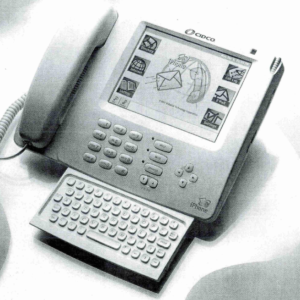Let’s take a look at an interesting story:
By the time Apple Inc. debuted iPhone in January 2007, the prefix “i” had already become a thing of Apple. The inauguration of iMac series dates back in 1998. In 2003, iPod was a mega hit.
Lesser known than Apple, however, there was a startup called InfoGear Technology Corporation, which developed an internet phone technology, called “iPhone.”
Yes, iPhone™ by InfoGear.

Of course, there’s nothing suspicious about Apple’s iMac; the iMac trademark was first registered in 1995 by Digi International Inc. which assigned the trademark to Apple in 1998. Here, Apple did a right thing; it bought the iMac trademark before announcing iMac.
But, how about iPhone? Based on the USPTO’s record, InfoGear used the iPhone trademark from 1997, and it was registered in 1999. Apple filed its iPhone trademark application in January 8th, 2007. (Steve Jobs unveiled iPhone to the world the next day).
Can Apple do that? Absolutely “NO” said Cisco who brought a lawsuit against Apple based on its iPhone trademark purchased along with InfoGear.
In all fairness, if Cisco proved its seriousness about iPhone in the court, we might now have “iPod 4G LTE Advanced” instead of “iPhone 7.”
Who knows what Steve Jobs said to Cisco, but Cisco somehow agreed to a concurrent use of the iPhone trademark. (Apple probably challenged Cisco’s iPhone trademark by saying that “i” prefix had been associated with Apple product even before Cisco’s registration.) Well, assuming Cisco had a valid and enforceable trademark right, what could’ve happened?
Cisco would say the iPhones sold by InfoGear and Apple were both communication devices, and customers would likely be confused. Of course, Apple would say they are totally different devices; but Apple likely loses on this account.
As a counter, Apple could’ve argued that Cisco stopped using the trademark (thereby lost its right). Then, the followings become relevant: How many iPhone Cisco sold? How many people bought, used, knew or seen iPhone by Cisco? Had Cisco advertised iPhone? My guess is that Cisco purchased the iPhone trademark, but it really didn’t think about using it much.
So, be aware that to own a trademark, you have to actually use it, which means placing your goods/services (bearing that mark) in the market.
Trademark registration provides security. For example, companies often file intent-to-use (“ITU”) applications before making and selling new products. Without the ITU, mobile phone companies won’t be able to announce a flagship model months earlier than actual release, nor can they push an advertising campaign for a new product before they make sales. (Announcing or even advertising is not enough to establish a use of trademark under the trademark law.)
Trademark registration provides security. For example, companies often file intent-to-use (“ITU”) applications before making and selling new products. Without the ITU, mobile phone companies won’t be able to announce a flagship model months earlier than actual release, nor can they push an advertising campaign for a new product before they make sales. (Announcing or even advertising is not enough to establish a use of trademark under the trademark law.)
